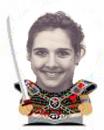vendredi, 19 septembre 2008
Learning Hindi, by Sarah MacDonald
Voici un extrait de Holy Cow qui m'a fait pleurer de rire - bon Ok faut peut-être être dans le bain mais vous avouerez que c'est quand même rigolo!
I now decide to arm myself with language. India was hundred of languages, but Hindi is the common tongue in Delhi. The ABC office finds me a teacher and he arrives bowing low.
Hari Lal (whose name means ‘green red’) is tiny, balding and has shiny skin the colour of warm walnut. Softly, sweetly and firmly, he tells me that he’s one of the few people in Delhi who speaks proper Hindi and he’s glad to be of assistance. His first insistence is that I attach a ji to everybody’s name as this is a term of high respect and means ‘soul one’. Hari Lal tells me the Hindi hello, namaste ji, means ‘I recognize the divine in you’. It’s a lovely sentiment I’m happy to adopt. But Hari’s Hindi is more practical than spiritual. It’s memsahib Hindi; the language of the lady of the manor. I repeat after him:
‘Clean the table.’
‘Make Indian dinner tonight as we are holding a reception.’
‘Please send this telegraph to London.”
‘Go call sahib.”
And my favorite: Agar magar mudt kidjeaye – ‘No ifs and buts please.’
Jonathan and I lay a bet on who will use it first.
But as I haltingly begin to use the phrases, Rachel laughs, Abraham startles, taxi drivers stare at me and the local beggars retreat in shock. I ask the ABC office researcher – a young funky woman called Simi – what I’m doing wrong and try out a few sentences on her. She tries to stop herself laughing but her eyes twinkle and her shoulders shake.
‘Sarah, the thing is this. Harry Lal is teaching you formal Hindi and Urdu, no-one speaks it here. You should speak Hindustani. You are being too polite.’
I feel like an idiot. I’ve been talking a language that died out with the British Raj. When I thought I was asking a taxi driver to take me somewhere I was really saying, ‘Kind sir, would thou mind perhaps taking me on a journey to this shop and I’d be offering you recompense of this many rupees to do so, thank you frightfully humbly.’ And I’ve been greeting filthy naked street urchins with, ‘Excuse me, o soul one, but I’m dreadfully sorry, I don’t appear to have any change, my most humble of apologies.’
I carefully and respectfully suggest to Hari Lal-ji that perhaps I could learn the informal way of talking and perhaps some street Hindi.
His cup of chai clatters into the saucer, he pulls himself up to his full height of four feet ten and sharply and sternly states, ‘Madam, please, these people of Delhi are uneducated and rude, we will not speak like filth, we shall speak properly, as befitting your station, I will not talk like that, I absolutely refuse.’
There begins a battle of wills that keeps me from communicating with the locals for months to come.
When I ask him how to tell a taxi driver he’s ripping me off, he suggests a phrase that translates as: ‘Is your taxi made of gold, dear man?’
When I want to tell a man to stop staring at me, he suggests: ‘Haven’t you a mother or sister at home?’
And when I ask what I should have said to the man in the visa office, he suggests: ‘You are making my moustache droop.’
‘But, Hari-ji, I protest, I don’t have a moustache.’
‘No, madam, but it means “you are threatening my honour”, moustaches must always twirl upwards.’
13:05 Publié dans IncredIble India | Lien permanent | Commentaires (1) | Tags : inde, extrait de lecture, holy cow, sarah macdonald, learning hindi |  Imprimer |
Imprimer | ![]() Facebook |
Facebook |

